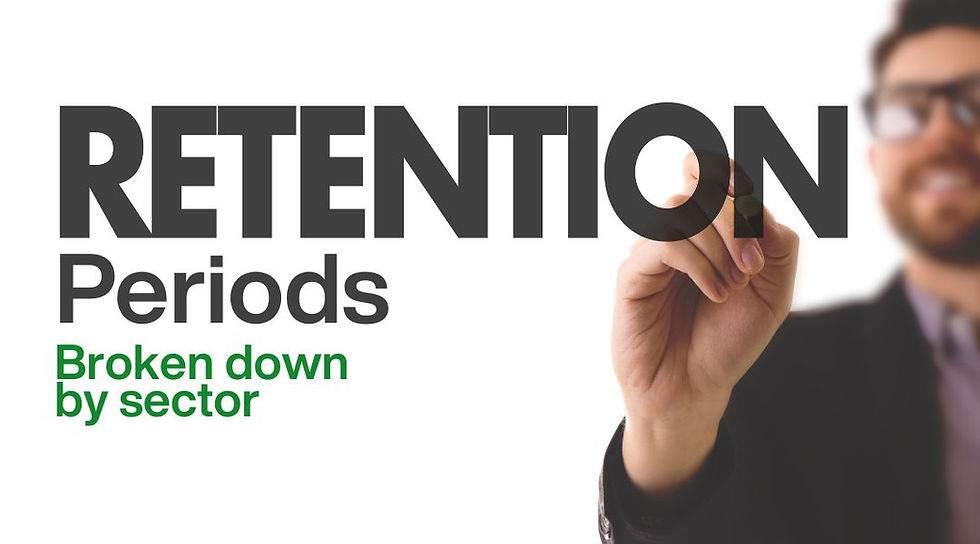Reference Guide to Retention Periods by Sector
- Maryna Farrell
- Aug 11, 2025
- 3 min read
Know how long to keep your business records to stay compliant.

Every organisation creates and stores a huge volume of documents — from contracts and HR files to patient records and financial statements. But knowing how long to keep each type of document isn’t always straightforward.
Retention periods vary by sector, document type, and legal obligations. Storing files for too long increases the risk of data breaches and unnecessary costs. Disposing of them too soon could leave your organisation exposed to fines, legal challenges, or operational gaps.
To help, we’ve created a quick reference guide to document retention periods by sector in the UK.
Why Retention Periods Matter
Compliance: UK GDPR, FOI (Freedom of Information), and sector-specific regulations require that personal and business records are only kept for as long as needed.
Audit & Legal Protection: Proper retention ensures you can evidence decisions and actions if needed.
Cost & Risk Management: Holding unnecessary files wastes storage space and increases data breach risk.
1. Legal Sector
Solicitors, barristers, and legal service providers manage highly sensitive client records. Retention is critical for protecting clients — and the firm.
Common retention periods:
Document Type | Typical Retention Period |
Client matter files | 6 years (can vary by matter type) |
Wills and probate files | Indefinite for original wills; 12 years for probate files |
Contracts and agreements | 6–12 years depending on limitation period |
Court case records | 6 years post-completion |
Tip: Always refer to SRA guidance and your firm’s professional indemnity terms before destruction.
2. Healthcare (NHS and Private)
Healthcare records are strictly regulated under NHS Records Management Code of Practice and UK GDPR.
Common retention periods:
Record Type | Retention Period |
Adult patient records | 8 years after treatment |
Maternity records | 25 years after birth of last child |
Children & young people records | Until 25th birthday (or 26th if care continued past 17) |
GP patient records (digital/paper) | 10 years after patient leaves practice |
Imaging (X-ray, MRI) | 8 years (standard) |
Tip: Never destroy healthcare records without following your NHS Trust or clinic’s IG policy.
3. Finance and Accounting
Financial documentation supports audits, tax returns, and regulatory compliance.
Common retention periods:
Record Type | Retention Period |
Invoices & receipts | 6 years (HMRC requirement) |
Payroll & PAYE records | 3–6 years |
Bank statements & reconciliations | 6 years |
VAT records | 6 years (HMRC) |
Pension records | Permanent or as advised |
Tip: For companies subject to audit, consider retaining records slightly beyond the HMRC minimum to support future audits.
4. Local Government and Public Sector
Councils and government agencies hold a mix of citizen, legal, and operational records, often under the Local Government Act and Public Records Act.
Common retention periods:
Document Type | Retention Period |
Council tax & rates records | 6 years |
Housing and tenancy records | 12 years after end of tenancy |
Planning applications & building control | Permanent or 15+ years |
Committee minutes & agendas | Permanent |
Electoral registration records | 15 years |
Tip: The Local Government Association (LGA) and The National Archives provide sector-specific retention schedules.
5. HR and Employee Records
Every organisation, regardless of sector, must manage HR records responsibly.
Common retention periods:
Record Type | Retention Period |
Personnel files | 6 years after employment ends |
Recruitment records (unsuccessful) | 6–12 months |
Disciplinary records | 6 years post-resolution |
Training and qualifications | Duration of employment |
Health & safety records | 40 years for exposure records |
Best Practices for Managing Retention
Create a Retention Schedule: Document how long each record type is kept.
Review Regularly: Schedule annual reviews to identify files for archiving or secure destruction.
Digitise Where Possible: Scanned, indexed files make retention tracking and secure disposal easier.
Always Document Destruction: Keep a log or certificate of destruction for compliance audits.
How MDSS Can Help
We support organisations across legal, healthcare, finance, and public sectors with:
Secure off-site document storage
Bulk and specialist document scanning
Retention and archiving support
Confidential shredding with full audit trails
From keeping critical records safe to ensuring compliant destruction, we make document management simple and stress-free.
Not sure how long to keep your records?Our team can help you create a retention schedule that ticks every compliance box.



Comments